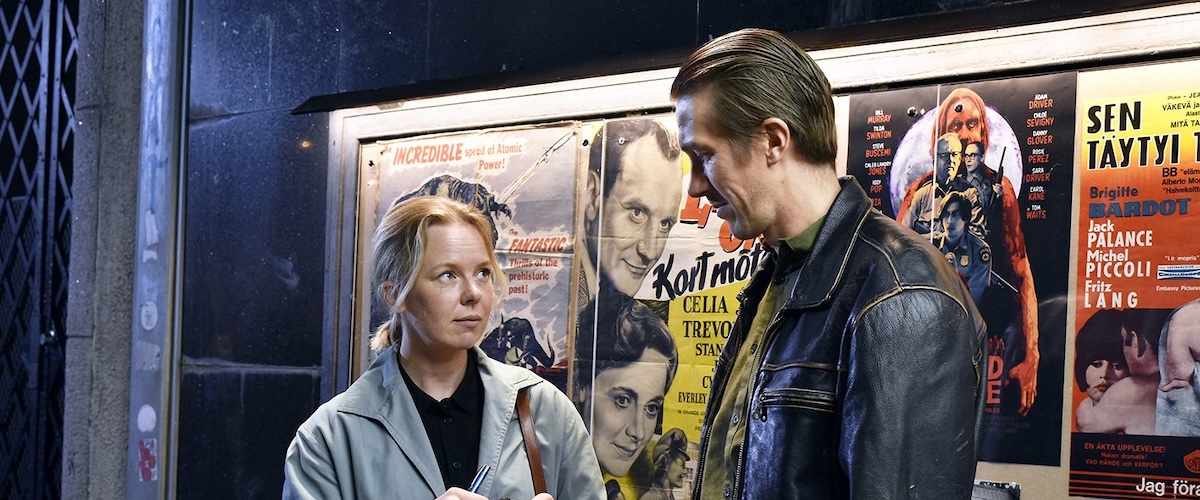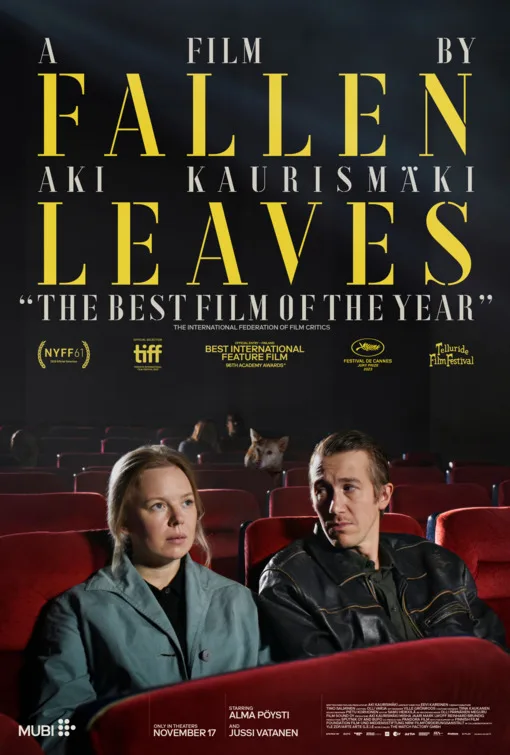What constitutes a perfect film? A perfect film doesn’t have to be in any particular genre, in any event. A perfect film knows what it’s about, knows what it wants to say, and knows that even when what it has to say is unusually simple, what it says can’t be reduced to words or any form of description apart from the thing itself. Which means that a perfect film has to be seen in order for its perfection to be appreciated.
So I don’t want to say too much, or perhaps it’s better put, to write too much, about “Fallen Leaves,” the latest motion picture written and directed by Finnish maestro Aki Kaurismäki, his first in six years. Just an hour and twenty minutes long, the movie is a soulful romance that goes through conventional narrative paces. A man and woman, both cocooned in loneliness, almost meet, then do meet, then can’t meet, then meet again, then come to an understanding that unites them. The complications are familiar if you’re a human being and a follower of Kaurismäki’s prior work. There’s booze, there are bad jobs, there’s an encroaching outside world full of troubles. This isn’t an overtly socially conscious work the way that Kaurismäki’s recent immigration-themed comedy dramas have been but one of its leitmotifs is that whenever Alma Pöysti’s Ansa turns on her radio, there’s a report on the war in Ukraine.
This movie is set in our times, though like all of Kaurismäki’s films, it has an unusually retro mise-en-scene, apparent in even the teeniest design detail. Ansa’s radio has a circular analog dial on its face. While she does own a microwave, it’s the most basic box imaginable. A band shows up late in the movie, and one notes that In Kaurismäki’s world, the electric guitars all have single-coil pickups, never a humbucker. If you understand why this matters, you’re in tune with his aesthetic.
Ansa begins as a grocery store cashier whose soft heart gets her fired—she’s caught donating expired food to a hungry homeless man. A couple of her coworkers walk out with her. She first sees Jussi Vatanen’s lanky-of-frame-and-hair Holappa at a karaoke bar where his buddy Huotari (the droll Janne Hyytiäinen) tries to wow the ladies with his pipes, only to be informed that he’s too old-looking. Holappa doesn’t sing. Indeed, his preferred mode of being is inside a bottle or flask. But looking at Ansa sparks him up a little. Eventually, if he wants the emotional connection he seems to seek, he’ll have to make some choices as he drifts from job to job. In his depictions of soused fellows, Kaurismäki has never depicted an AA meeting, but he skirts pretty close to doing so here.
The key to this movie’s winning emotional delicacy is its formal sturdiness. Every shot has a specific job to do and does it well. The performances are measured and restrained. I used to say of the writer/director that he can really put the “dead” in “deadpan,” but the way he opens both his stories and performers to convey an unexpected, understated warmth is completely winning. As happens in Kaurismäki’s movies, the introduction of an enigmatic dog gives the movie a lift. Ansa initially calls the mutt “dog,” but at the movie’s honestly uplifting ending, she reveals a new name, one that bestows the film itself with its own best honorific. It’s too good a touch to spoil, so I won’t.
Now playing in theaters.




















